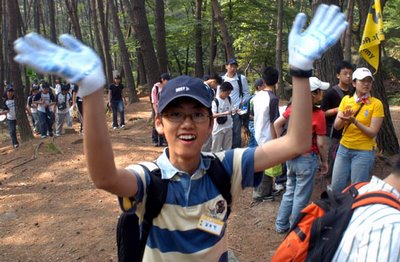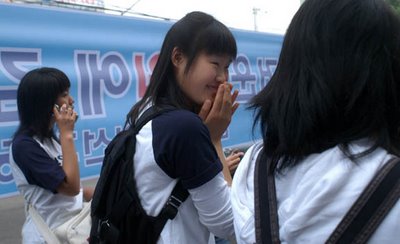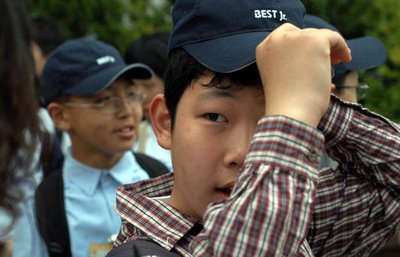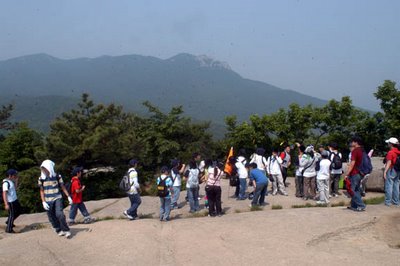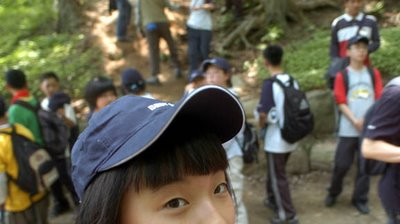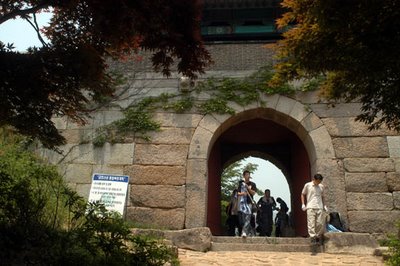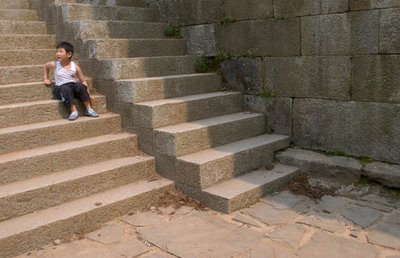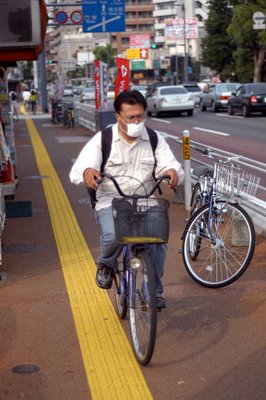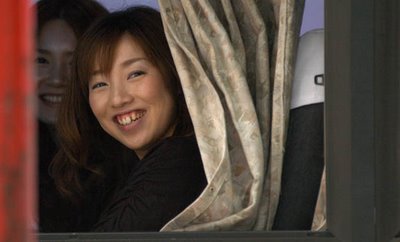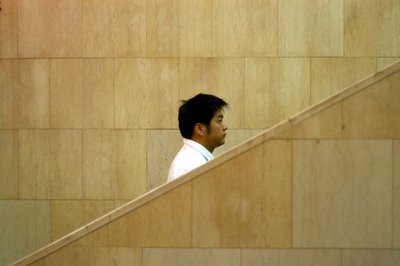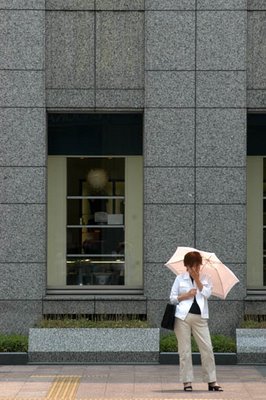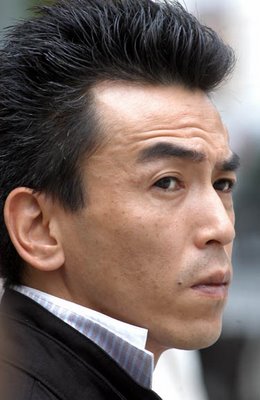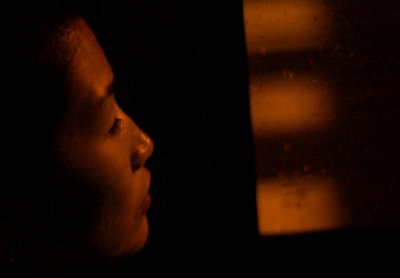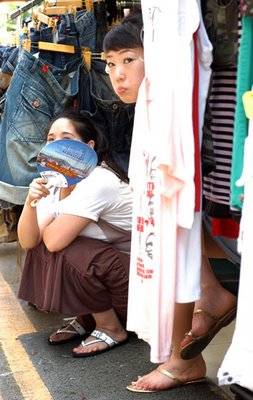
Around six A.M. two Mondays ago I was roused from my sleep by a tremendous but sublime sound seemingly coming from everywhere at once. Korea's soccer team had just scored the tying goal against France with only a handful of minutes left on the clock and the people of Dongsamjugong apartments were on their feet in front of their TVs, yelling...
...DAE-HAN-MIN-GO!!! DAE-HAN-MIND-GO!!! DAE-HAN-MIN-GO!!!
I fell back asleep.
The World Cup. Never has it had much impact on my life...That is until I traveled outside of the United States...
Once every four years the world comes together in peace to kick a round plastic ball back and forth. Obscure nations like Togo pop out of the woodwork to engage major world players like France in 'The Beautiful Game.' As you well know, the event is more than just a contest between soccer's finest athletes. The World Cup is a geopolitical forum of sorts where the recently oppressed can do battle with their oppressors, the smallest of nations can reign over the giants, and obscure countries can showcase their forgotten or underrepresented cultures.
When I think of the World Cup, I think of England versus Argentina in 1986, I think of Nigeria versus Spain in 1998, and most recently I think of Korea in 2002. That year Korea and Japan co-hosted the sporting event. Japan made it to the final 16, a respectable finish. Korea, on the other hand, stunned the world (and in some measure its own people) with a tremendous fourth-place finish.
As far as my own country is concerned, soccer is a growing, but still undernourished, seed in American culture. Actually, I find the American attitude towards soccer painfully reflective of our isolated national character and snobbish relationship to the rest of the planet. Nothing serves to highlight the emotional and social disconnect between the United States and the rest of the world quite like soccer. The most powerful nation on the planet couldn't even make Croatia blink as the smaller nation nailed it to the wall, three to zilch.
According to my coworkers, until the 2002 World Cup, soccer took a back seat to baseball and basketball in Korea. As the World Cup got under way in Germany a few weeks ago, someone new to Korea would think quite the opposite. Everyone was dressed in red. Se-yeon and Ji-Hyun came to class every day wearing oversized red T-shirts with red and black devil's horns on their heads. Se-yeon's lit up like Christmas tree lights. Ji-hyun's were longer. Much to the detriment of my sanity, the two girls routinely engaged in spirited "dae-han-min-go" yelling-contests.
The children were electrified by the event, full of energy, and I knew from the outset that I would need to find a channel for that energy or risk being overwhelmed by it. All they wanted to talk about in Advanced Three and Advanced Four were penalty kicks, teams, the new coach and the Korean athletes.
I structured a number of our activities around the World Cup. In 6A, which was studying the past tense, I crafted a writing exercise called "play-by-play." I drew a soccer field on the board and diagramed the movements of the soccer players from both teams during a critical play. I then numbered the play from 1 to 5. In groups of two, the children wrote what happened in each play. They were the announcers. They used new verbs like dribble, tackle, shoot and defend, and lots of new, soccer-oriented nouns. The spatial nature of sports also forces the students to think about and correctly use prepositions. While they worked, I walked around, checked their work, and when they were finished I had them present to the class.
"Play-by-play" was a good activity. The students liked talking about their favorite players. However, my opus this past two weeks has been a game called "Shootout." In Shootout, I write a bunch of verbs on the board, separated by lines like a goal net. I write the names "Korea" and "France" on the board and tell the students that the score is tied, the overtime period is over and the game must be determined by a shootout. One student from France serves as a goal keeper and one student from Korea serves as a shooter. The shooter throws the Sticker Chicken at the board, and if the keeper doesn't block the shot, the shooter must make a correctly-conjugated sentence with the word he hit. If he makes a correct sentence, it's a point. If he fumbles the words or miss-conjugates the verb, the goal keeper has a chance to "block his shot" and make a correct sentence. Then they switch.
This game was the "perfect storm" of teaching English. It combined the children's love for throwing things at one another with their nationalistic fervor for soccer into one high-energy, high-competition game. What's more, it was a highly malleable game, open to many different lessons. There was only one problem: Mrs. Nam hated it.
She lectured me on playing too many games last week. She said that the children were starting to expect games all the time, even in their Korean classes. In short, it felt like she was asking me to chant all the time.
I extended my contract into mid-October so I could pay for a journey to Argentina. My friend Faith has lived in Argentina for a few years, and thus I can tour this beautiful country on the cheap. So look for SoKoNotes to become El Notes in October! Just kidding. It's going to be SoKoNotes until the day I step off the airplane at Hartsfield-Jackson International Airport November 2nd.
After many requests, I've decided to bring back the Korean Files. I had no idea so many of you enjoyed the desecration of the English language that much! Helping things is the approach of summer. The warmer weather means more T-shirts. More T-shirts means more Konglish. Lots more. What I'm saying is that I have plenty to work with these days. These two statements are from students' T-shirts.
"We Hope, We Will Camp All Friends" (Nurse! I need a preposition, stat!!!)
"Spoon Athletics" (The brand of choice among high-performance gluttons the world over)
Ah, and here are a few photos from the last few weeks. The aperture-actuation arm (say that five times fast) on my Nikon D100 keeps getting stuck and ruining my photos. I've got to take it to get fixed on Monday, so don't expect any photos for at least one update. These are the last ones for a couple weeks.
It must be hard to be a taxi driver here. They drive so fast that their radiator grills and windshields must pick up bugs like crazy. Their like Busan's four-wheeled fly-swatters. Must be hard to keep that finish shinin.'
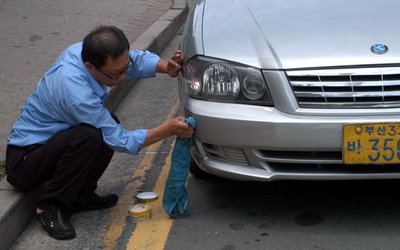
Meet the most wonderful person I have met in Busan: Hyun-jeong. I cannot express to you how happy I am when we are together. She is a very thoughtful, creative person, and I learn so much from her every day. Case in point: We went to the BEXCO center a few weekends back to see the International Tea Festival. Performing traditional Inca dances on the tarmac outside the hulking glass and steel monolith were a trio of Ecuadorian men. Hyun-jeong, who majored in Spanish and who spent a month living with a hispanic family in Sacramento, California, struck up a conversation with one of them.
Other people just stuck camera-phones in the Ecuadorian's face. I guess to them, he was nothing more than a foreign curiosity, like an exotic animal. It was a striking contrast to Hyun-jeong, who was engaged and interested in the man, his home and his history, making an effort to see and know the human being behind the strange traditional clothes and face-paint. I was really impressed. Here is a photo I took of her in the Busan History Museum.
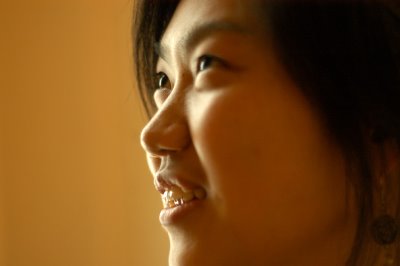
Like many Koreans, Hyun-jeong is a fierce defender of her country's history and image. She is up on all of the major issues, from the American military presence to the slow drifting apart of North and South Korea. She has a lot of interesting insights into these issues and she has managed to turn my fledgling knowledge on its head from time to time. Take for example Park, Jeong-hee, the seminal figure in South Korea's Phoenix-like rise from the ashes of the Korean War.
In college, my Asian-American literature class briefly touched on Korean history when were reading books such as "Comfort Woman," a book about the atrocious sexual subjugation of Korean women by the Japanese army during World War II. My teacher, a plump feminist with a penchant for sad stories, described Park, Jeong-hee as the "JFK of Korea." At the time, I just swallowed that information like I swallowed most of what was taught in University as truth and didn't give it any more thought.
Last winter I gave my high school students the job of researching and then making a presentation on one person in Korean history. One student picked Park, Jeong-hee. In the course of the project, this student reported that Park, Jeong-hee helped secure the loans and laws needed for robust economic growth to take off, and is credited with providing the conditions necessary for companies like Hyundai and Samsung to get their start. He also was assassinated.
Wait? What? Why would anyone assassinate someone who did so much good for their country? The student reported that Park also forgave the Japanese their reparations debt to Korea in exchange for normalized diplomatic relations. Oh, I see, I said and left it at that. Koreans generally hate Japan the country, and with ample reason.
However, the story goes deeper than that, and I had no idea until Hyun-jeong gave me an article on Park, Jeong-hee. Though born into poverty, Park, Jeong-hee was a savvy politician from the beginning. When he was born, Japan was the colonial ruler of Korea, and they were working hard to erase everything "Korea" from the face of the planet. They forbade the use of Hangukmal (the language), gave everyone Japanese names and forced them to practice the Shinto religion. Like I said, during the war they kidnapped and shipped thousands of Korean women into the Japanese army's prostitution corps.
Park thought he saw which way the wind was blowing during the war, incorrectly pinned the Japanese as the eventual winners, and joined the military. He was trained in Japanese Mongolia and quickly rose through the ranks to officer status in the air corp within just a few years. However, when the Japanese eventually lost the war to the American military, Park was quick to shed his Japanese name and rank and he reentered Korea in secret.
In the following years, Park vanished into the fog of postwar Korea. He found work as a spy for the fledgling Korean secret police, and following the Korean War, he staged a successful coup and took power. Park was deeply in love with Japanese culture. It is rumored that he fancied himself a samurai and enjoyed Japanese geisha and music. When he forgave the Japanese their debt, he also confiscated the money the Japanese had paid to Korean war veterans and plowed it into Korea's infrastructure.
In the final years of his "democratic dictatorship," Park's corrupt regime stole billions from their taxpayers, controlled elections, skimmed off the top line from the developing corporations and ran up huge debts to American and Japanese banks which the Korean people are still paying back at obscene interest rates to this day. Like all politicians, Park was a mix of good and bad, I just had no idea how much 'bad' was involved. The man might have done some good for Korea, but he was certainly no JFK.
As I just mentioned, we went to BEXCO to see the International Tea Festival. It was Sunday, so the festival was winding down by the time we got there. Vendors from across the country and China manned booths, letting people sample their steaming green or yellow teas. When I drink green tea, the flavor is like the pungent taste of the earth itself, spiced with a raw, leafy, slightly bitter aftertaste.
The women serving the tea dressed in colorful Hanbok and carefully served their wares in handmade fired-clay cups. From preparation to the first sip, everything about green tea screams, "healthy."

Some of the vendors at the festival were artisans. One woman made clay statues of Koreans engaged in daily life. Another person painted beautiful watercolor-style portraits in the black India-ink of traditional Korean writing on long white tapestries.

Well, I’m done for now. I hope you enjoyed this segment of SoKoNotes. Next weekend my sister Sara comes to visit. She is an amazing person, and I can’t wait to see her. Also, like I said, the culture shock will be interesting to document. She doesn’t have any idea how different Korea and Japan really are. Peace. --Notes
